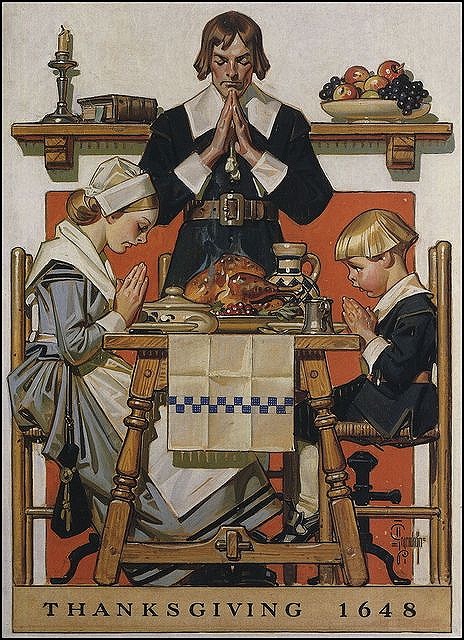SecularHolidays

J.C Leyendecker: "Thanksgiving" [American Weekly cover art] (1940)
"SecularHolidays seem to be all about the food and remembering to say grace."
The founding American principle separating church and state might have quite naturally necessitated the creation and observance of not higher holy days, but secular ones. Visit Italy and you're likely to feel surprised when you find a bank closed on a Monday to observe some obscure, previously unknown to you, holy day of obligation. No worry about that happening here, except by rather accidental coincidence. Christmas, probably the pre-eminent SecularHoliday in the Ewww Ess of A, happens to share a day with several prominent sporting events and a rather mammon-rich exchange of what are referred to as gifts but often amount to payoffs, vigorish in a vigorous competition. On Ash Wednesday, Catholics can be spotted walking around wearing ashy crosses smeared on their foreheads, and that might turn a head or two, but on Halloween, otherwise respectable supermarket checkers show up for work decked out in the most outrageously ghoulish get-ups, and nobody turns a head. It's understood that it's a SecularHoliday, and everybody gets a pass. ©2020 by David A. Schmaltz - all rights reserved
Thanksgiving seems the most curious one, a SecularHoliday dedicated to gorging and recreating family trances. Everyone suffers from at least a touch of a fresh seasonable bout of Norman Rockwell Poisoning, as we imagine our extended family arrayed around a mid-forties dining room table with a plump grandma laying a turkey-laden platter before us. We salivate at the very thought, though most of us never really experienced anything very much like this. Our families seemed so very much more complicated, with long-lived petty feuds dividing us into 'thems' and 'us-es', even in the best of times. Home for this holiday rarely if ever qualified as a fanciful jaunt over the river and through a few woods to arrive at grandmother's house. And the myth upon which the whole tradition rested seemed increasingly questionable. Pilgrims and the Indians they displaced were only briefly friendly. One of my ancestors was murdered by some during a war his people started. He received well-earned cooked goose for his final feast. We might say grace because we're in desperate need of it, but prayer soon over, we celebrate by loading up the plates; the Freedom From Want primary in our minds by then. (Whose idea was that jello "salad"?)
The Fourth of July celebrates our military might, about as far from holy as any holiday might find us. We simulate bombs bursting in air, for cripes sake, and casually violate local ordinances against the personal use of fireworks, for nothing says freedom like thumbing our arrogant noses at the authorities. We muster parades and display our pride as if it had somehow been magically separated from falling for this one special day. We freely terrorize little sisters with sparklers and permanently stain the front sidewalk with those lame little smoky snakes. We eat to excess watermelon, corn on the cob, and some protein blackened over flame. No prayers are offered, though the older ones remove their hats in genuine reverence when the flag passes by. We might engage in some baseball, The Great American Pastime, to demonstrate our fealty, fielding, and devotion.
Flag Day, Veteran's Day, and what was traditionally called Columbus Day were never celebrated with the sincerity of a Christmas or an Easter, or any of the many and varied non-Christian holy days observed here. Christmas has become an absolute orgy of conspicuous consumption. Easter—many actually attend a church service that morning—features traditional feasting, ham if you're counting, and egg hunting, and perhaps new hats for the ladies. Both produce late-afternoon groaning as gorging tends to eventually get even the better of us. Our final acts, both Christmas and Easter, might be swallowing a Pepcid® to ease the old stomach acid, a prominent side-effect of our secular celebrating. We sense a touch of remorse before proceeding back into ordinary times.
I prefer a quiet and sequestered New Year, though I am a veteran of several attempted rowdy ones, not one of which turned out well for me. The Muse and I usually sit before a fire and cut up old magazines to create collages, which we firmly believe will come to represent what happened through the following year. A family friend once created one which featured pictures of South Sea beaches. Early the next year, she won an all expense paid vacation to Fiji or something, and became a life-long believer in the predictive power of New Year's Eve collages. Ours produce similar if not quite such dramatic results, and require more focused interpretation to understand their deeper meanings. We remember each new year as a semi-sacred intrusion of synchronicity into our lives, which might be just about as holy and reverent as we ever get on any holiday these days.
This year, there's really no place like home for the SecularHolidays. This Damned Pandemic has thrown a monkey wrench into any attempt to mindlessly replicate our mythical histories. Truth told, I always preferred the quiet ones, the SecularHolidays were I wasn't completely immersed in some reactive passion play attempting to recreate some ill-remembered bygone day. I struggle with my seasonal bout of Norman Rockwell Poisoning without pouting or growing any more than normally remorseful. The old days extinguish themselves and I usually manage to find something inspiring for myself. The Muse musters up the traditions. She makes the stuffing from the recipe she inherited from her grandmother and recreates the cranberry-orange relish so acidic it leaves my face burning. We'll make a dozen meals from the leftovers and manage to waste little and even regain our taste for poultry in time to warmly welcome the Christmas goose. SecularHolidays seem to be all about the food and remembering to say grace. We really need to remember to say grace this year!


